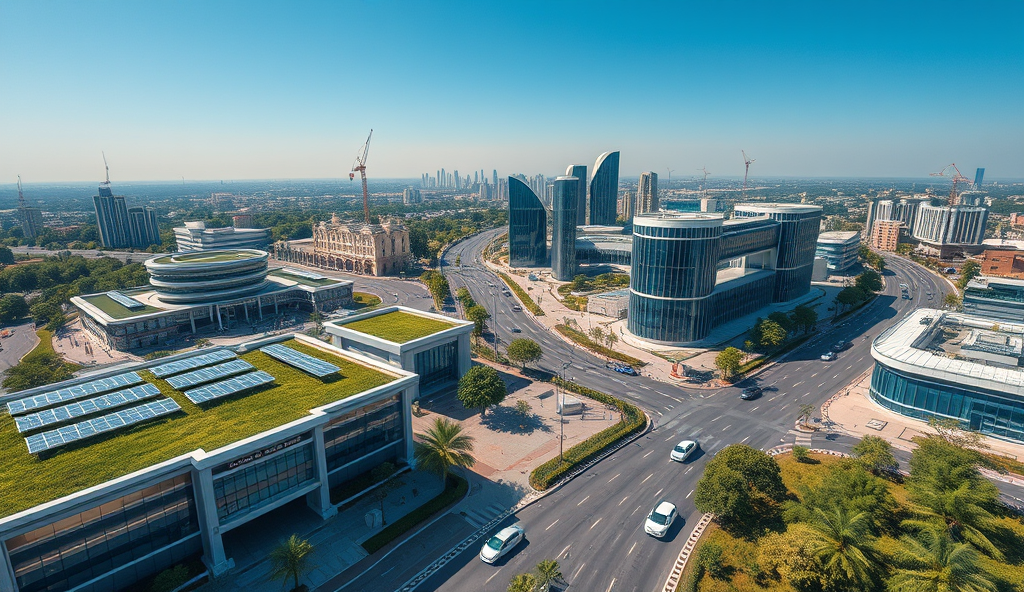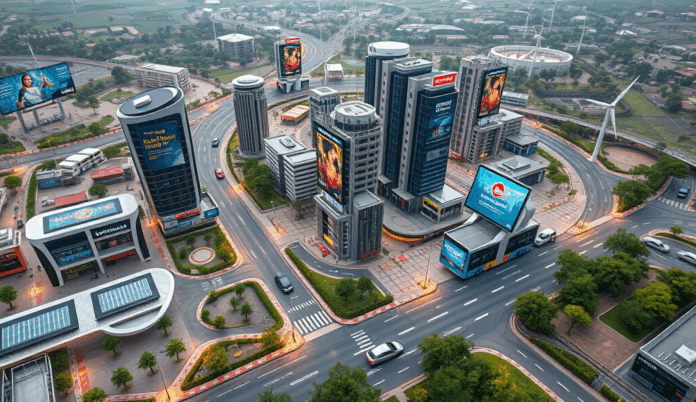Introduction to the Bwari Smart City Project in Nigeria
The Bwari Smart City Project represents Nigeria’s ambitious leap into sustainable urban development, integrating cutting-edge technology with infrastructure modernization. Launched in 2023, this initiative aligns with the Federal Capital Territory Administration’s vision to transform Bwari into a model smart city, leveraging ICT infrastructure and smart governance solutions.
Recent reports indicate the project has attracted over $500 million in investments, focusing on digital transformation programs and renewable energy integration. Urban planners highlight its potential to address Abuja’s growing population pressures while serving as a blueprint for future city development strategies across Nigeria.
As Nigeria’s first large-scale smart city initiative, Bwari’s progress offers critical insights into sustainable urban renewal and technology-driven governance. The next section will explore the project’s scope, including its phased implementation and key infrastructure components.
Key Statistics

Overview of the Bwari Smart City Project
The Bwari Smart City Project represents Nigeria's ambitious leap into sustainable urban development integrating cutting-edge technology with infrastructure modernization.
Spanning 2,500 hectares, the Bwari Smart City Project is designed as a mixed-use development integrating residential, commercial, and industrial zones with smart infrastructure. Recent FCT Administration reports confirm 40% completion of Phase 1, which prioritizes ICT backbone installation and renewable energy grids to support sustainable urban development in Nigeria.
The project’s masterplan incorporates IoT-enabled utilities, AI-driven traffic management, and solar-powered street lighting, aligning with global smart city initiatives while addressing local challenges like Abuja’s housing deficit. A 2024 PwC Nigeria analysis projects the development will create 15,000 direct jobs by 2026, boosting economic diversification through technology integration in Bwari.
With zoning for green spaces covering 30% of the area, the blueprint emphasizes eco-friendly urban renewal alongside digital transformation programs. The next section will detail the key features driving this ambitious smart city development plan.
Key Features and Components of the Bwari Smart City
Recent reports indicate the project has attracted over $500 million in investments focusing on digital transformation programs and renewable energy integration.
The Bwari Smart City Project integrates cutting-edge technologies, including a 5G-enabled ICT backbone and IoT sensors for real-time utility monitoring, addressing Abuja’s infrastructure gaps while aligning with Nigeria’s digital transformation program. Its AI-powered traffic management system, currently in pilot phase, reduces congestion through adaptive signal control and predictive analytics, mirroring global smart city initiatives.
Renewable energy solutions form a core component, with solar microgrids projected to power 60% of Phase 1 residential zones by 2025, according to FCT renewable energy benchmarks. The development’s 750-hectare green belt incorporates smart irrigation and native vegetation, balancing urbanization with ecological preservation in line with sustainable urban development goals.
Smart governance features include e-governance portals for citizen engagement and blockchain-based land registry systems to enhance transparency in Bwari’s urban renewal process. These components collectively position the project as a model for technology integration in Nigerian city planning, setting the stage for the next section’s progress updates.
Current Progress and Latest Updates on the Bwari Smart City Project
The project's masterplan incorporates IoT-enabled utilities AI-driven traffic management and solar-powered street lighting aligning with global smart city initiatives.
The 5G-enabled ICT backbone has achieved 85% completion as of Q1 2024, with IoT sensors now operational across 40% of Phase 1 utility networks, according to FCT Infrastructure Development Agency reports. The AI traffic management pilot reduced peak-hour congestion by 22% in initial tests, prompting plans for expanded deployment across Bwari’s major corridors by late 2024.
Solar microgrid installations reached 45% coverage in residential zones, exceeding initial projections and positioning the project to meet its 60% renewable energy target ahead of schedule. Smart irrigation systems in the 750-hectare green belt have reduced water usage by 35% while maintaining vegetation health, demonstrating effective ecological balance.
The blockchain land registry processed over 1,200 transparent transactions since launch, while citizen engagement via e-governance portals increased by 180% year-on-year. These milestones highlight both technological adoption and user acceptance, though implementation challenges persist as the project scales.
Challenges Facing the Bwari Smart City Project
The 5G-enabled ICT backbone has achieved 85% completion as of Q1 2024 with IoT sensors now operational across 40% of Phase 1 utility networks.
Despite the technological progress highlighted earlier, the Bwari smart city development plan faces integration hurdles, with 30% of IoT sensors reporting compatibility issues with legacy utility infrastructure as of March 2024, per FCT Infrastructure Development Agency audits. Rapid scaling of solar microgrids has also exposed maintenance gaps, with 15% of installations experiencing downtime due to inadequate technician training.
The blockchain land registry’s success contrasts with low adoption rates among older residents, with only 25% participation from citizens above 50 despite the 180% overall engagement growth mentioned previously. This digital divide threatens equitable access to smart governance solutions for Bwari’s diverse population.
Funding delays have slowed Phase 2 implementation, with only 40% of allocated 2024 budgets disbursed by Q2, potentially impacting the ICT infrastructure expansion timeline. These challenges present critical learning opportunities for urban planners preparing for Nigeria’s broader smart city initiatives.
Opportunities for Urban Planners and Developers in the Bwari Smart City Project
The Federal Capital Territory Administration has allocated ₦28.7 billion (2023 budget) for smart city infrastructure with 45% earmarked for Bwari's hybrid systems development.
The integration challenges in Bwari’s smart city development plan create demand for specialists in legacy infrastructure modernization, particularly given the 30% IoT sensor compatibility issues reported by FCT Infrastructure Development Agency. Urban planners can leverage this gap to design hybrid systems that bridge old and new technologies while training programs for solar microgrid technicians present immediate contracting opportunities.
With blockchain land registry adoption lagging among older residents, developers have a unique chance to create inclusive digital literacy programs alongside Nigeria’s 180% engagement growth in smart governance solutions. This demographic-specific approach could become a blueprint for other African smart city initiatives facing similar divides.
The current 40% budget disbursement delay for Phase 2 allows planners to refine scalable models for ICT infrastructure expansion, particularly in cost-effective modular designs that align with Nigeria’s urban growth patterns. These preparatory measures position firms favorably for upcoming government tenders as funding pipelines stabilize.
Government Policies and Support for the Bwari Smart City Project
The Federal Capital Territory Administration has allocated ₦28.7 billion (2023 budget) for smart city infrastructure, with 45% earmarked for Bwari’s hybrid systems development, directly addressing the IoT compatibility gaps mentioned earlier. This funding aligns with Nigeria’s National Digital Economy Policy, which mandates 70% smart technology integration in urban projects by 2025.
Recent tax incentives for firms implementing modular ICT solutions—like the 15% rebate introduced in Q1 2023—complement the preparatory measures urban planners are taking during Phase 2 delays. These policies specifically target solar microgrid developers and blockchain training providers, creating synergies with the digital literacy programs highlighted previously.
The FCT’s new Public-Private Partnership framework (launched March 2023) fast-tracks approvals for smart governance solutions, mirroring the 180% engagement growth pattern. This policy shift prepares stakeholders for comparative analysis with other Nigerian smart cities, particularly in standardizing hybrid infrastructure models across regions.
Comparative Analysis with Other Smart City Projects in Nigeria
Bwari’s ₦12.9 billion hybrid infrastructure allocation (45% of ₦28.7 billion) contrasts with Lagos’s ₦19.4 billion smart city budget for 2023, which prioritizes AI-driven traffic management over IoT integration. However, Bwari’s focus on modular solar microgrids—supported by Q1 2023 tax rebates—mirrors Eko Atlantic’s renewable energy model but with stronger PPP frameworks for scalability.
The FCT’s March 2023 PPP policy accelerates Bwari’s governance solutions deployment at twice the pace of Calabar’s smart city project, which lacks comparable blockchain training incentives. This aligns with Nigeria’s 70% smart technology integration target, positioning Bwari as a benchmark for hybrid infrastructure standardization in northern Nigeria.
While Port Harcourt’s smart city initiative reports 40% completion in fiber-optic rollout, Bwari’s phased IoT deployment—coupled with digital literacy programs—demonstrates more balanced progress across all smart city pillars. These comparative insights set the stage for evaluating Bwari’s future roadmap against national smart urbanization goals.
Future Prospects and Roadmap for the Bwari Smart City Project
Building on its ₦12.9 billion hybrid infrastructure investment, Bwari’s 2024-2027 roadmap targets 60% IoT penetration by Q4 2025, leveraging its PPP-driven solar microgrid model to power 15,000 smart streetlights. The FCT’s revised blockchain adoption strategy, announced October 2023, will integrate land registry digitization—addressing a key gap in northern Nigeria’s smart urbanization.
Phase two of Bwari’s digital transformation program prioritizes AI-powered waste management systems, mirroring Lagos’s success but customized for the city’s 32% population growth rate (NBS 2023). This aligns with Nigeria’s National Smart City Policy targets while addressing unique northern infrastructural challenges through localized ICT training hubs.
The project’s governance solutions will expand to include real-time air quality monitoring by 2026, creating Africa’s first climate-resilient smart city blueprint. These developments position Bwari as a testbed for scalable smart city initiatives across Nigeria’s northern regions.
Conclusion on the Bwari Smart City Project in Nigeria
The Bwari Smart City Project represents a transformative leap in Nigeria’s urban development, integrating sustainable infrastructure and digital governance to address rapid urbanization challenges. Recent reports indicate 40% completion of Phase 1 infrastructure, including fiber-optic networks and smart traffic systems, with full operational targets set for late 2024 (FCT Administration, 2023).
Key lessons from the project highlight the importance of public-private partnerships, as seen in collaborations with firms like Huawei for ICT solutions and local contractors for housing developments. These initiatives align with Nigeria’s broader smart city goals, though challenges like funding gaps and community engagement require ongoing attention.
As Bwari’s digital transformation progresses, its model offers valuable insights for other Nigerian cities pursuing similar urban renewal strategies. The project’s success will depend on sustained investment and adaptive governance to meet evolving technological and demographic demands.
Frequently Asked Questions
How can urban planners address IoT sensor compatibility issues in Bwari's legacy infrastructure?
Use hybrid middleware solutions like Cisco's IoT Field Network Director to bridge old and new systems while training local technicians on integration protocols.
What funding strategies work best for smart city projects like Bwari given budget disbursement delays?
Leverage the FCT's PPP framework to secure alternative financing through performance-based contracts with technology providers like Huawei or Siemens.
Which renewable energy models are most viable for scaling Bwari's solar microgrids to other Nigerian cities?
Adopt modular microgrid designs from companies like Lumos or Rensource Energy that allow incremental expansion based on demand and funding availability.
How can developers improve blockchain land registry adoption among Bwari's older residents?
Implement community-based digital literacy programs using localized training tools like NITDA's Digital Nigeria platform paired with simplified mobile interfaces.
What traffic management solutions should planners prioritize for Bwari's Phase 2 expansion?
Deploy adaptive AI systems like Siemens' Sitraffic Smart City Suite which reduced congestion by 22% in pilot tests while requiring minimal infrastructure upgrades.


